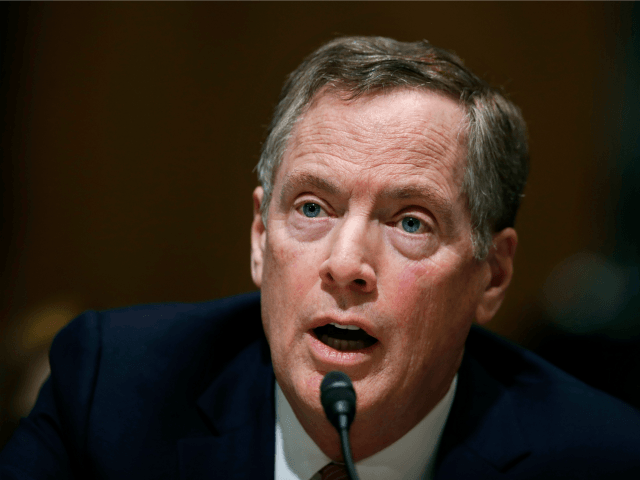President Donald Trump has repeatedly thundered against NAFTA, promising a “massive” renegotiation of the trade deal, but his attempts are just getting started.
Congress finally approved Robert Lighthizer, Trump’s nominee for the United States Trade Representative on Thursday, allowing the administration to begin “fast track” trade discussions with Congress. Lighthizer’s nomination was stalled in the Senate for four months, effectively freezing attempts from the administration to move forward on NAFTA.
Despite efforts by Commerce Secretary Wilbur Ross and National Trade Council Director Peter Navarro to progress Trump’s trade agenda, Congress insisted that Lighthizer be confirmed and in place before continuing fast track negotiations, according to White House sources.
“I would call it a slow track to hell,” a White House senior aide said in an interview with Breitbart News, blaming Republicans opposed to renegotiating trade deals and Democrats eager to stall Trump’s agenda. The administration still has to formally notify Congress of its intentions to renegotiate NAFTA, triggering a 90-day waiting period.
Trump shared his frustration in an interview with the Economist, pointing out that even though Mexico and Canada were ready to renegotiate NAFTA, his negotiator wasn’t confirmed.
“Here you have two people calling saying, ‘Can we negotiate?’ I say ‘Yes,’ and I have to wait for a hundred days,” Trump said. “I don’t know what a hundred days is going to be like.”
Three Republican Senators, John McCain, Ben Sasse and Cory Gardner, voted against Lighthizer, voicing dissent with Trump’s trade agenda.
“Unfortunately, your confirmation process has failed to reassure us that you understand the North American Free Trade Agreement’s (NAFTA) positive economic benefits to our respective States and the nation as a whole,” Sasse and McCain wrote in a joint statement expressing their decision to vote against Lighthizer.
“I’m afraid his policies could hurt Colorado’s farmers and ranchers,” Gardner explained after his vote, citing Lighthizer’s views on trade.
Philosophical divisions on trade extend to the White House, according to the Financial Times, as some of the president’s economic advisors want to carefully thread the negotiation process. Others favor a more dramatic approach, citing Trump’s campaign populist rhetoric against NAFTA.
Tensions were compounded by news that Trump was considering pulling out of NAFTA altogether, setting defenders of the trade deal scrambling to convince him otherwise. Although he ultimately agreed to renegotiate the deal rather than terminate it, Trump indicated that he seriously considered it.
“I was all set to terminate,” he said to the Economist. “This wasn’t like…this wasn’t a game I was playing. … I wasn’t playing chess or poker or anything else.”

COMMENTS
Please let us know if you're having issues with commenting.